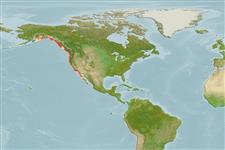Common names from other countries
Classification / Names / Names
Namen | Synonyme | Catalog of Fishes (gen., sp.) | ITIS | CoL | WoRMS
Environment: milieu / climate zone / depth range / distribution range
Ökologie
Pelagisch; tiefenbereich 20 - 180 m (Ref. 275). Tropical, preferred 13°C (Ref. 107945); 62°N - 26°N, 172°W - 112°W (Ref. 112699)
Eastern Pacific. Tropical to boreal.
Length at first maturity / Size / Gewicht / Alter
Maturity: Lm ? range ? - ? cm Max length : 19.2 cm ML Männchen/unbestimmt; (Ref. 94063); 17.9 cm ML (female); max. veröff. Gewicht: 148.00 g (Ref. 94063); max. veröff. Gewicht: 148.00 g
Caught by brails and night lights and pumps and night lights.
Life cycle and mating behavior
Geschlechtsreife | Fortpflanzung | Ablaichen | Eier | Fecundity | Larven
Mating and egg-laying occur at daylight (Refs. 94843, 94849), egg beds found at depths of 20-60 m (Ref. 94843).
Roper, C.F.E., M.J. Sweeney and C.E. Nauen. 1984. (Ref. 275)
IUCN Rote Liste Status (Ref. 130435: Version 2024-1)
CITES Status (Ref. 108899)
Not Evaluated
Not Evaluated
Nutzung durch Menschen
Fischereien: kommerziell
FAO - Fischereien: landings | FishSource | Sea Around Us
Tools
Internet Quellen
Estimates based on models
Preferred temperature
(Ref.
115969): 8.2 - 11.9, mean 9.2 (based on 23 cells).
Widerstandsfähigkeit
hoch, Verdopplung der Population dauert weniger als 15 Monate. (K=1).
Prior r = 0.93, 95% CL = 0.61 - 1.39, Based on 2 data-limited stock assessments.
Verwundbarkeit
Low vulnerability (10 of 100).
